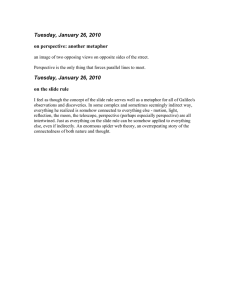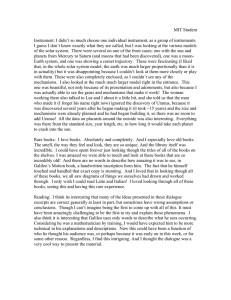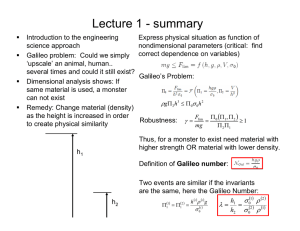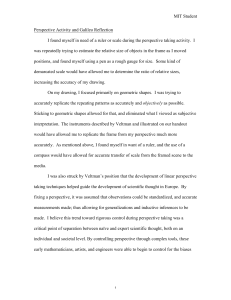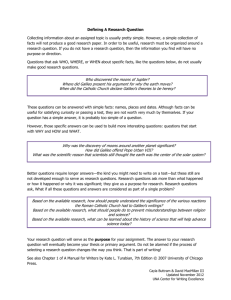Saturday, January 23, 2010 regarding discovery and information.
advertisement
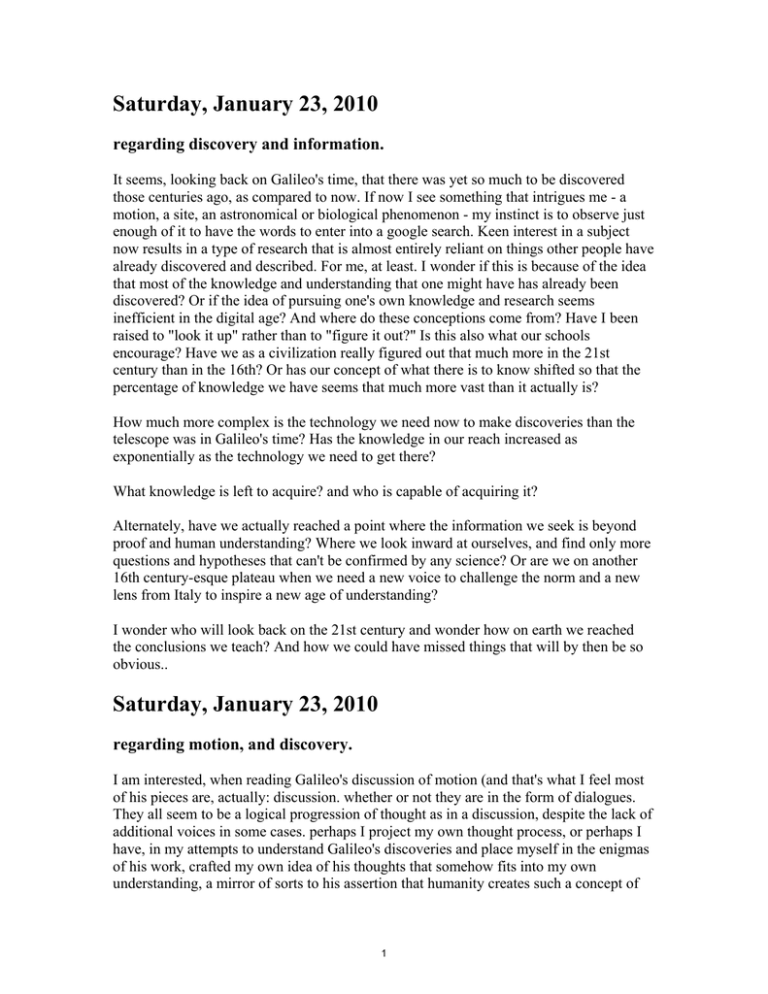
Saturday, January 23, 2010 regarding discovery and information. It seems, looking back on Galileo's time, that there was yet so much to be discovered those centuries ago, as compared to now. If now I see something that intrigues me - a motion, a site, an astronomical or biological phenomenon - my instinct is to observe just enough of it to have the words to enter into a google search. Keen interest in a subject now results in a type of research that is almost entirely reliant on things other people have already discovered and described. For me, at least. I wonder if this is because of the idea that most of the knowledge and understanding that one might have has already been discovered? Or if the idea of pursuing one's own knowledge and research seems inefficient in the digital age? And where do these conceptions come from? Have I been raised to "look it up" rather than to "figure it out?" Is this also what our schools encourage? Have we as a civilization really figured out that much more in the 21st century than in the 16th? Or has our concept of what there is to know shifted so that the percentage of knowledge we have seems that much more vast than it actually is? How much more complex is the technology we need now to make discoveries than the telescope was in Galileo's time? Has the knowledge in our reach increased as exponentially as the technology we need to get there? What knowledge is left to acquire? and who is capable of acquiring it? Alternately, have we actually reached a point where the information we seek is beyond proof and human understanding? Where we look inward at ourselves, and find only more questions and hypotheses that can't be confirmed by any science? Or are we on another 16th century-esque plateau when we need a new voice to challenge the norm and a new lens from Italy to inspire a new age of understanding? I wonder who will look back on the 21st century and wonder how on earth we reached the conclusions we teach? And how we could have missed things that will by then be so obvious.. Saturday, January 23, 2010 regarding motion, and discovery. I am interested, when reading Galileo's discussion of motion (and that's what I feel most of his pieces are, actually: discussion. whether or not they are in the form of dialogues. They all seem to be a logical progression of thought as in a discussion, despite the lack of additional voices in some cases. perhaps I project my own thought process, or perhaps I have, in my attempts to understand Galileo's discoveries and place myself in the enigmas of his work, crafted my own idea of his thoughts that somehow fits into my own understanding, a mirror of sorts to his assertion that humanity creates such a concept of 1 the heavens as we can understand, despite its truth being in a language of a God that may eternally be a mystery to us, and beyond our comprehension. The comparison of Galileo to a deity was initially unintentional, but now seems both appropriate and ironic in hindsight, given his acute awareness of the heavens and earth beyond what seems to be normal mortal understanding.), by what truths he must hold and what information he must lack to reach some of the conclusions he reaches. Beyond that, what truths were held at the time that influence and narrow his thinking such that I can only guess at its path? I find it a challenge, for example, to detach my thought process from concepts of gravity and friction (I am amused here by the symbolism in both of these terms) to speculate about understandings of motion centuries ago. I wonder what experiments I might try to discover these things without knowing they existed? How would I know if I had accidentally discovered something, not being aware of its existence? In these experiments with motion, I feel that the amazing concept of discovery is most clear and most amazing. How to recognize the discovery of something new, when you weren't aware that it hadn't yet been discovered? How to recognize the existence of something you had never previously considered - in fact, no one had every documented its previously having been considered? Clearly, to some degree the human mind is structured thus, to develop new understandings of things that it had not previously known as one's experience grows. But to what extent? And at what point does this cease, or at least slow to the point that the conceptualization of new ideas beyond the existing scope becomes a challenge to great to comprehend? I have heard that beyond the age of 2, the brain begins to discard information on sounds that is irrelevant to the prevalent sound patterns in a child's life. For example, a child brought up hearing only English might struggle with sound patterns that differ or exist only in the Chinese language, and vice versa. Do learners of all ages reach a point where it is impossible to imagine things one doesn't already know to exist or be possible? I feel that this is true. When does this happen? Does the brain actually reach a point where it is biologically unnecessary to continue to add new grand concepts of understanding? Or do the concepts themselves become too large? What does a two-year-old understand about gravity - if I push this off the table, it falls -- that an adult turns into a different idea about the world and the universe? The idea of discovery itself is so vast and overwhelming. It is perhaps appropriate that my brain struggles to understand this idea of learning and understanding. But I will continue to think on it nonetheless. 2 MIT OpenCourseWare http://ocw.mit.edu EC.050 Recreate Experiments from History: Inform the Future from the Past: Galileo January IAP 2010 For information about citing these materials or our Terms of Use, visit: http://ocw.mit.edu/terms.
